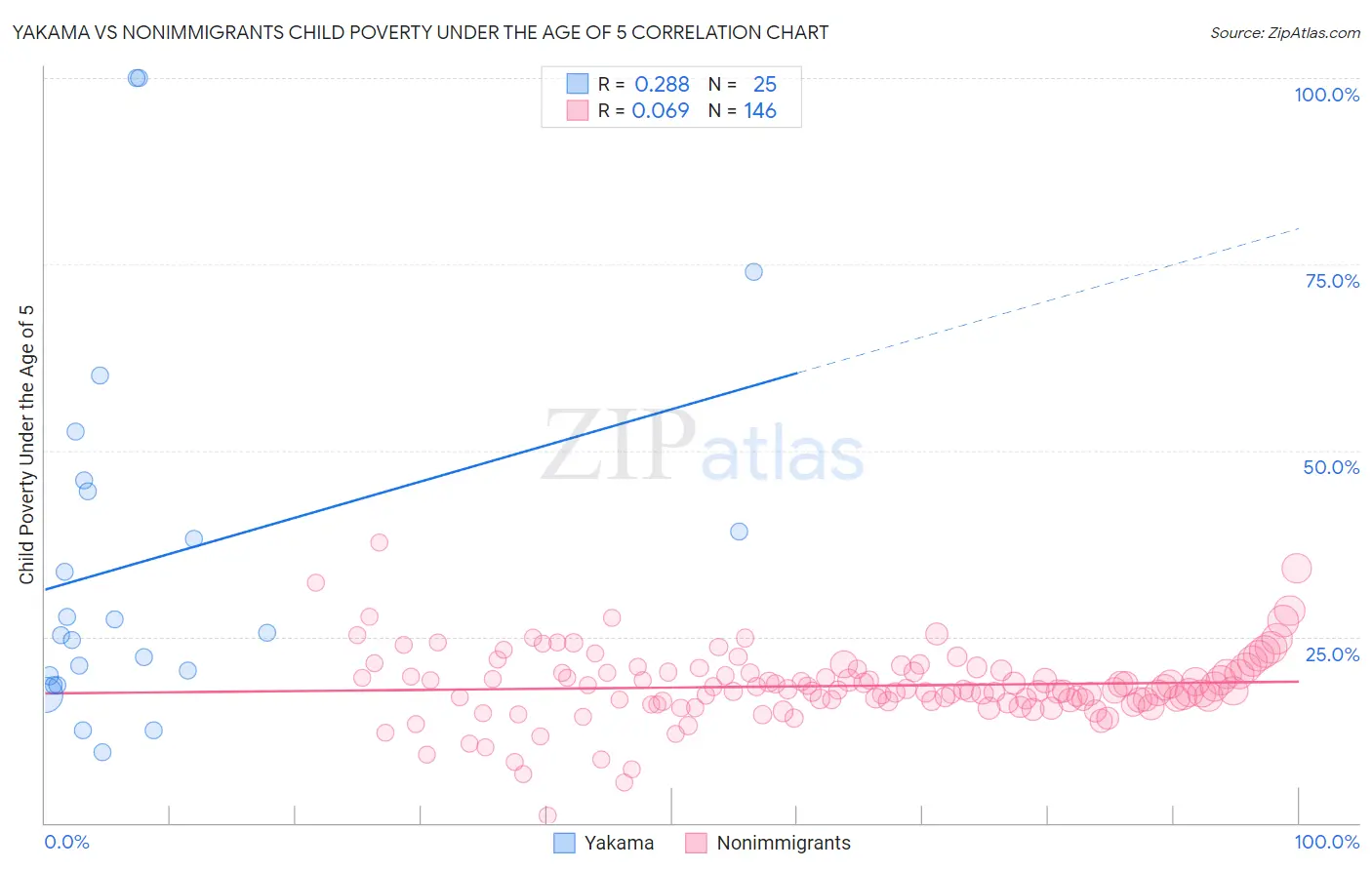Yakama vs Nonimmigrants Child Poverty Under the Age of 5
COMPARE
Yakama
Nonimmigrants
Child Poverty Under the Age of 5
Child Poverty Under the Age of 5 Comparison
Yakama
Nonimmigrants
23.1%
CHILD POVERTY UNDER THE AGE OF 5
0.0/ 100
METRIC RATING
316th/ 347
METRIC RANK
19.7%
CHILD POVERTY UNDER THE AGE OF 5
0.4/ 100
METRIC RATING
250th/ 347
METRIC RANK
Yakama vs Nonimmigrants Child Poverty Under the Age of 5 Correlation Chart
The statistical analysis conducted on geographies consisting of 19,733,416 people shows a weak positive correlation between the proportion of Yakama and poverty level among children under the age of 5 in the United States with a correlation coefficient (R) of 0.288 and weighted average of 23.1%. Similarly, the statistical analysis conducted on geographies consisting of 540,384,913 people shows a slight positive correlation between the proportion of Nonimmigrants and poverty level among children under the age of 5 in the United States with a correlation coefficient (R) of 0.069 and weighted average of 19.7%, a difference of 17.2%.

Child Poverty Under the Age of 5 Correlation Summary
| Measurement | Yakama | Nonimmigrants |
| Minimum | 9.4% | 1.0% |
| Maximum | 100.0% | 37.7% |
| Range | 90.6% | 36.6% |
| Mean | 35.6% | 18.4% |
| Median | 25.6% | 17.9% |
| Interquartile 25% (IQ1) | 19.1% | 16.4% |
| Interquartile 75% (IQ3) | 45.3% | 20.4% |
| Interquartile Range (IQR) | 26.1% | 4.0% |
| Standard Deviation (Sample) | 24.9% | 4.9% |
| Standard Deviation (Population) | 24.4% | 4.9% |
Similar Demographics by Child Poverty Under the Age of 5
Demographics Similar to Yakama by Child Poverty Under the Age of 5
In terms of child poverty under the age of 5, the demographic groups most similar to Yakama are Arapaho (23.1%, a difference of 0.12%), Menominee (23.3%, a difference of 0.50%), Dutch West Indian (23.3%, a difference of 0.60%), U.S. Virgin Islander (23.0%, a difference of 0.68%), and Bahamian (23.0%, a difference of 0.76%).
| Demographics | Rating | Rank | Child Poverty Under the Age of 5 |
| Houma | 0.0 /100 | #309 | Tragic 22.7% |
| Africans | 0.0 /100 | #310 | Tragic 22.8% |
| Seminole | 0.0 /100 | #311 | Tragic 22.8% |
| Hondurans | 0.0 /100 | #312 | Tragic 23.0% |
| Bahamians | 0.0 /100 | #313 | Tragic 23.0% |
| U.S. Virgin Islanders | 0.0 /100 | #314 | Tragic 23.0% |
| Arapaho | 0.0 /100 | #315 | Tragic 23.1% |
| Yakama | 0.0 /100 | #316 | Tragic 23.1% |
| Menominee | 0.0 /100 | #317 | Tragic 23.3% |
| Dutch West Indians | 0.0 /100 | #318 | Tragic 23.3% |
| Chippewa | 0.0 /100 | #319 | Tragic 23.4% |
| Choctaw | 0.0 /100 | #320 | Tragic 23.5% |
| Immigrants | Honduras | 0.0 /100 | #321 | Tragic 23.5% |
| Ute | 0.0 /100 | #322 | Tragic 23.5% |
| Pueblo | 0.0 /100 | #323 | Tragic 23.7% |
Demographics Similar to Nonimmigrants by Child Poverty Under the Age of 5
In terms of child poverty under the age of 5, the demographic groups most similar to Nonimmigrants are Immigrants from Middle Africa (19.7%, a difference of 0.050%), Marshallese (19.7%, a difference of 0.070%), Guyanese (19.7%, a difference of 0.080%), Pennsylvania German (19.8%, a difference of 0.17%), and Immigrants from Nicaragua (19.8%, a difference of 0.22%).
| Demographics | Rating | Rank | Child Poverty Under the Age of 5 |
| Osage | 0.5 /100 | #243 | Tragic 19.6% |
| Immigrants | Ghana | 0.5 /100 | #244 | Tragic 19.6% |
| Immigrants | Western Africa | 0.4 /100 | #245 | Tragic 19.7% |
| Cree | 0.4 /100 | #246 | Tragic 19.7% |
| Guyanese | 0.4 /100 | #247 | Tragic 19.7% |
| Marshallese | 0.4 /100 | #248 | Tragic 19.7% |
| Immigrants | Middle Africa | 0.4 /100 | #249 | Tragic 19.7% |
| Immigrants | Nonimmigrants | 0.4 /100 | #250 | Tragic 19.7% |
| Pennsylvania Germans | 0.3 /100 | #251 | Tragic 19.8% |
| Immigrants | Nicaragua | 0.3 /100 | #252 | Tragic 19.8% |
| Mexican American Indians | 0.3 /100 | #253 | Tragic 19.9% |
| Fijians | 0.3 /100 | #254 | Tragic 19.9% |
| Immigrants | Cuba | 0.2 /100 | #255 | Tragic 19.9% |
| Immigrants | Barbados | 0.2 /100 | #256 | Tragic 20.0% |
| Shoshone | 0.2 /100 | #257 | Tragic 20.0% |